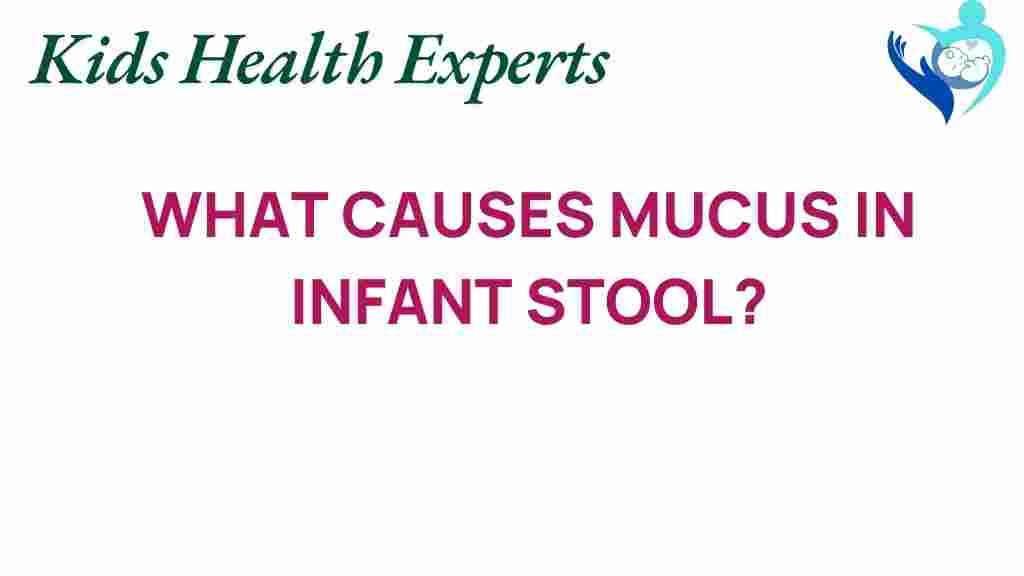Mucus in Infant Stool: Understanding the Causes and Implications
As parents, monitoring our baby’s health can feel overwhelming, especially when it comes to their bowel movements. One common concern that many new parents encounter is the presence of mucus in infant stool. This article will unravel the mystery behind this phenomenon, its implications for your baby’s digestive health, and essential parenting tips to ensure your little one thrives.
Understanding Infant Digestive Health
The digestive system of infants is still developing, making them susceptible to various changes and conditions. Mucus is a natural substance produced by the body to protect and lubricate tissues. In the context of a baby’s stool, the presence of mucus can signal several things, some of which are normal, while others may require further investigation.
What Does Mucus in Infant Stool Indicate?
When you notice mucus in your infant’s stool, it can be helpful to understand the possible causes:
- Normal Variation: Mucus can be a normal component of stool, especially in breastfed babies.
- Infection: Mucus may indicate a gastrointestinal infection, particularly if accompanied by other symptoms such as diarrhea or fever.
- Allergies: Food allergies or sensitivities, particularly to dairy or soy, can lead to increased mucus production.
- Gastrointestinal Conditions: Conditions such as irritable bowel syndrome (IBS) or inflammatory bowel disease (IBD) can present with mucus in stool.
Recognizing Normal vs. Abnormal Mucus
It’s essential to differentiate between normal and abnormal mucus in your infant’s stool. Here are some signs to look out for:
- Normal Mucus: Small amounts of clear to white mucus mixed with the stool.
- Abnormal Mucus: Large amounts of mucus, particularly if it’s green or yellow, and accompanied by blood or changes in your baby’s behavior or feeding.
Step-by-Step Guide: What to Do If You Notice Mucus in Infant Stool
If you notice mucus in your baby’s stool, follow these steps to ensure their well-being:
Step 1: Observe
Take note of the frequency, color, and consistency of the mucus and stool. Keep a diary of your baby’s bowel movements, noting any accompanying symptoms such as:
- Change in feeding habits
- Fever
- Diarrhea
- Crankiness or unusual behavior
Step 2: Evaluate Diet
Consider any recent changes in your baby’s diet. If you’ve introduced new foods, they might be the culprit. For breastfeeding mothers, assess your own diet as it can affect your baby’s stool.
Step 3: Consult Your Pediatrician
If the mucus persists or is accompanied by concerning symptoms, it’s crucial to consult your pediatrician. They may conduct tests to rule out infections or allergies. Here are some questions to ask:
- What could be causing the mucus?
- Are there specific dietary changes we should consider?
- When should I be concerned about my baby’s bowel movements?
Step 4: Follow Pediatric Advice
Once you have consulted with your pediatrician, follow their advice closely. They may recommend dietary adjustments, monitoring, or further testing.
Common Concerns About Mucus in Infant Stool
As parents, it’s natural to have concerns regarding your baby’s health. Here are some common concerns related to mucus in infant stool:
1. Is Mucus Always a Sign of Illness?
No, mucus is not always indicative of a serious condition. It can be a normal part of digestion in infants. However, if it is persistent or accompanied by other symptoms, it’s important to seek advice.
2. Can Mucus Affect My Baby’s Feeding?
In some cases, excessive mucus might indicate a food intolerance, which could affect your baby’s appetite. If you notice a correlation between mucus and feeding, discuss it with your pediatrician.
3. How Can I Promote Healthy Bowel Movements?
Ensuring your baby has healthy bowel movements involves several factors:
- Infant Nutrition: Provide a balanced diet appropriate for your baby’s age. For breastfed babies, your diet can also play a significant role.
- Hydration: Ensure your baby is well-hydrated, especially if they are consuming solids.
- Regular Check-ups: Schedule regular pediatric visits to monitor your baby’s growth and digestive health.
Tips for Parents: Managing Digestive Health in Infants
Here are some parenting tips to help manage your baby’s digestive health:
- Monitor Bowel Movements: Keep track of your baby’s bowel movements to identify any changes early.
- Introduce New Foods Gradually: When starting solids, introduce new foods one at a time to monitor for allergies.
- Stay Calm: Stress can affect your baby’s digestive health. Maintain a calm environment during feeding times.
Troubleshooting Tips for Parents
If you’re dealing with mucus in your infant’s stool, consider the following troubleshooting tips:
1. Dietary Adjustments
Consider eliminating potential allergens from your diet if you are breastfeeding. Common allergens include:
- Dairy
- Soy
- Wheat
2. Observation and Documentation
Document changes in your baby’s stool patterns and any potential triggers. This information can be invaluable to your pediatrician.
3. Comfort Measures
Ensure your baby is comfortable. If they seem fussy or irritable, gentle tummy massages or warm baths can help soothe them.
Conclusion: Prioritizing Your Infant’s Digestive Health
In summary, mucus in infant stool can be a common occurrence and often is not a cause for concern. However, understanding the context, monitoring your baby’s health, and consulting with your pediatrician are crucial steps in ensuring your infant’s digestive health. With the right knowledge and parenting tips, you can confidently navigate this aspect of baby care and promote a happy, healthy start for your little one.
For more insights on caring for your baby’s health, check out this helpful resource. If you want to learn about infant nutrition, visit this external link.
This article is in the category Conditions and created by KidsHealthExperts Team
